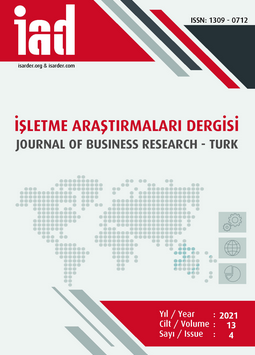Asimetrik Bilginin, Örgüte Güven, Müşteri Memnuniyeti ve Sadakati Üzerine Etkisinin Yapısal Eşitlik Modeli ile Belirlenmesi
Determining the Effect of Asymmetric Information on Organization Trust, Customer Satisfaction and Loyalty Using Structural Equation Model
Author(s): Kağan Altay, Şule DaricanSubject(s): Methodology and research technology, Management and complex organizations
Published by: Orhan Sağçolak
Keywords: Asymmetric Information; Trust in Organization; Customer Satisfaction; Customer Loyalty;
Summary/Abstract: Purpose – The purpose of this study is to determine the effect (lack) of information needs of insurance service recipients about the service they receive on the organization’s trust, customer satisfaction and loyalty. Design/methodology/approach – The study has a non-experimental quantitative research design and is a screening model according to the method of doing it. The Study’s content consists of 8 big insurance agencies serving in Istanbul where people receive services. Explanatory factor analysis for the scales was used in the study and confirmatory factor analyses were applied for the construct validity of the (EFA) and scales. The structural equation model (SEM) was applied to determine the relationships and test hypotheses and the results were evaluated. The data obtained from the scale used in the study were analysed using SPSS and AMOS package program. Findings – According to the SEM Model, the SB variable has a significant 0.652 unit-reducing relationship on OG. On the other hand, the ASB variable is significantly associated with 0.781 unit reduction on MM. Finally, the ASB variable was significantly associated with a 0.794 unit reduction on MS. Discussion – It has been shown that the results are obtained by more comprehensive studies. In a number of studies conducted in the past, it has been revealed that there is a relationship between asymmetric information trust, satisfaction and loyalty. As a result of the research, it was seen that asymmetric information negatively and significantly affected organization trust, customer satisfaction and loyalty. Another result within the scope of the study is that the negative effect of the asymmetric information variable is mostly seen on customer loyalty, then customer satisfaction and finally trust in the organization. Unlike other studies, this study examined the effect of asymmetry information variable on trust in the organization, including the relationship of asymmetric information with customer satisfaction and loyalty variables, in a holistic model and contributed to the literature in this respect.
Journal: İşletme Araştırmaları Dergisi
- Issue Year: 13/2021
- Issue No: 4
- Page Range: 3060-3075
- Page Count: 16
- Language: Turkish

